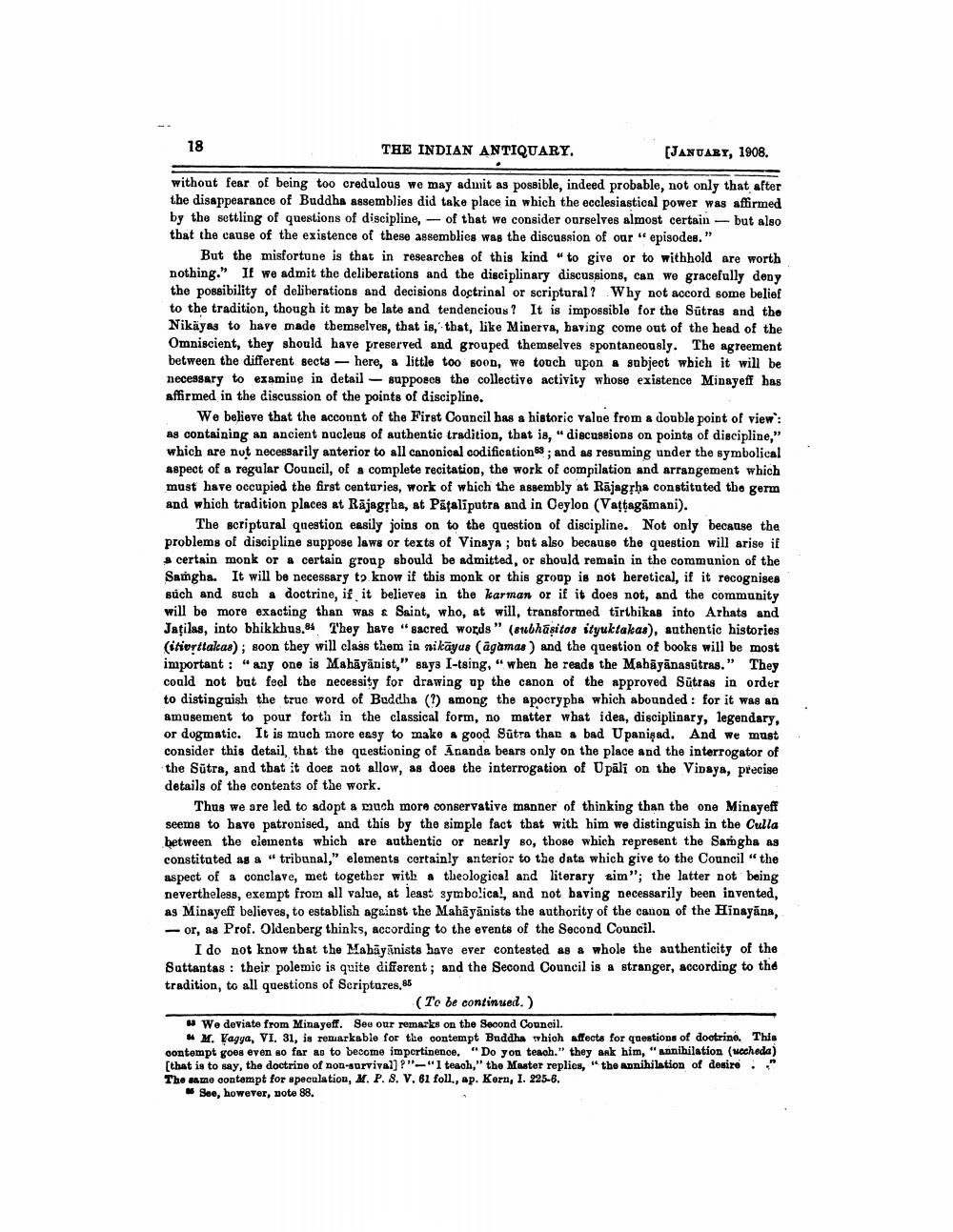________________
18
THE INDIAN ANTIQUARY.
(JANUARY, 1908.
without fear of being too credulous we may admit as possible, indeed probable, not only that after the disappearance of Buddha assemblies did take place in which the ecclesiastical power was affirmed by the settling of questions of discipline, -of that we consider ourselves almost certain - but also that the cause of the existence of these assemblies was the discussion of our "episodes."
But the misfortune is that in researches of this kind to give or to withhold are worth nothing." If we admit the deliberations and the disciplinary discussions, can we gracefully deny the possibility of deliberations and decisions doctrinal or scriptural? Why not accord some belief to the tradition, though it may be late and tendencious? It is impossible for the Sütras and the Nikäyas to have made themselves, that is, that, like Minerva, having come out of the head of the Omniscient, they should have preserved and grouped themselves spontaneously. The agreement between the different sects - here, a little too soon, we touch upon a subject which it will be necessary to examine in detail - suppoece the collective activity whose existence Minayeff has affirmed in the discussion of the points of discipline.
We believe that the account of the First Council has a historic value from a double point of view: as containing an ancient nucleus of authentic tradition, that is, " discussions on points of discipline," which are not necessarily anterior to all canonical codifications; and as resuming under the symbolical aspect of a regular Council, of a complete recitation, the work of compilation and arrangement which must have occupied the first centuries, work of which the assembly at Rājagrha constituted the germ and which tradition places at Rājagha, at Pataliputra and in Ceylon (Vattagāmani).
The scriptural question easily joins on to the question of discipline. Not only because the problems of discipline suppose laws or texts of Vinaya ; but also because the question will arise if s certain monk or a certain group should be admitted, or should remain in the communion of the Samgha. It will be necessary to know if this monk or this group is not heretical, if it recognises such and such a doctrine, if it believes in the karman or if it does not, and the community will be more exacting than was & Saint, who, at will, transformed tirtbikas into Arhats and Jatilas, into bhikkhus.84 They have "sacred words(subhasitos ityuktakas), authentic histories (iniorttalcas); soon they will class them in nikāyus (agamas ) and the question of books will be most important: "any one is Mahāyānist," says I-tsing," when he reads the Mahāyānasūtras." They could not but feel the necessity for drawing up the canon of the approved Sūtras in order to distinguish the true word of Buddha (?) among the apocrypha which abounded : for it was an amusement to pour forth in the classical form, no matter what idea, disciplinary, legendary, or dogmatic. It is much more easy to make a good Sutra than a bad Upanişad. And we must consider this detail, that the questioning of Ananda bears only on the place and the interrogator of the Sūtra, and that it does not allow, as does the interrogation of Upāli on the Vinaya, precise details of the contents of the work.
Thus we are led to adopt a much more conservative manner of thinking than the one Minayeff seems to have patronised, and this by the simple fact that with him we distinguish in the Culla between the elements which are authentic or nearly so, those which represent the Samgha as constituted as a " tribunal," elements certainly anterior to the data which give to the Council "the aspect of a conclave, met together with a theological and literary sim"; the latter not being nevertheless, exempt from all value, at least symbolical, and not baving necessarily been invented, as Minayeff believes, to establish against the Mahāyānists the authority of the canon of the Hinayāna, - or, as Prof. Oldenberg thinks, according to the events of the Second Council.
I do not know that the Mahāyānists have ever contested as a whole the authenticity of the Sattantas : their polemic is quite different; and the Second Council is a stranger, according to the tradition, to all questions of Scriptures, 86
(To be continued.) # We deviate from Minayoff. See our remarks on the Second Council.
M. Vagya, VI. 31, is remarkable for the contempt Buddha which affects for questions of doctrine. This contempt goes even so far ao to become impertinence. "Do yon teach." they ask him, "Annihilation (uccheda) (that is to say, the doctrine of non-survival] P"-"1 teach," the Master replies, the annihilation of desire. " The same contempt for speculation, M. P. 8. V. 61 foll., ap. Kern, I. 225-6.
45 See, however, note 88.




